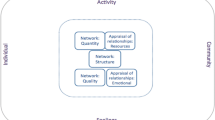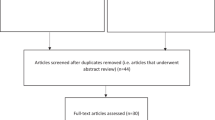Abstract
Given the unprecedented operational tempo of the Afghanistan and Iraq wars and the heavy involvement of the Reserve and National Guard, the stress that military families are exposed to is distinct from stress in earlier conflicts, with little empirical data to inform the impact on non-deployed military caregivers or “home caregivers.” The study seeks to examine the experiences of home caregivers during deployments, with a focus on the impact of deployment on the caregiver’s well-being. We conducted 50 qualitative interviews and 1,337 survey interviews with home caregivers who experienced at least one deployment. The structured qualitative interview focused on caregiver experiences during deployment. The quantitative data centered on caregiver well-being and household and relationship hassles. The qualitative interview notes were the unit of analysis and traditional methods were used to analyze the data. The quantitative data were analyzed using regression models. The qualitative data revealed key deployment-related household challenges that caregivers experience and the effect of those challenges on caregivers. Multivariate analyses of the quantitative data explored differences in caregivers’ emotional well-being, household and relationship hassles. The results showed important component and deployment experience differences. Caregivers affiliated with the National Guard and those with more months of deployment reported significantly poorer emotional well-being, and more household and relationship hassles. Given the important role that maternal well-being has on child and family functioning, it is critical to understand how the stress of deployment is affecting mothers in their daily routines, especially during potentially high stress periods.
Similar content being viewed by others
References
Department of Defense. (2006). Profile of the military community. Washington, DC: Department of Defense.
Hoge, C. W., Auchterlonie, J. L., & Milliken, C. S. (2006). Mental health problems, use of mental health services, and attrition from military service after returning from deployment to Iraq or Afghanistan. Journal of the American Medical Association, 295, 1023–1032.
Hoge, C. W., Castro, C. A., Messer, S. C., McGurk, D., Cotting, D. I., & Koffman, R. L. (2004). Combat duty in Iraq and Afghanistan, mental health problems, and barriers to care. New England Journal of Medicine, 351(1), 13–22.
Milliken, C. S., Auchterlonie, J. L., & Hoge, C. W. (2007). Longitudinal assessment of mental health problems among active and reserve component soldiers returning from the Iraq war. Journal of the American Medical Association, 298(18), 2141–2148.
Tanielian, T., Jaycox, L. H., & Schnell, L. (2008). Invisible wounds of war: psychological and cognitive injuries, their consequences, and services to assist recovery. Santa Monica: RAND Corporation: MG-720-CCF.
Huebner, A. J., Mancini, J. A. (2005). Adjustments among adolescents in military families when a parent is deployed. Final report to the Military Family Research Institute and Department of Defense Quality of Life Office. Report; 30 June 30 2005.
Chandra, A., Burns, R. M., Tanielian, T., Jaycox, L. H., & Scott, M. M. (2008). Understanding the impact of deployment on children and families [electronic resource]: findings from a pilot study of operation purple camp participants. Santa Monica, CA: RAND; Report No.: WR-566.
Flake, E. M., Davis, B. E., Johnson, P. L., & Middleton, L. S. (2009). The psychosocial effects of deployment on military children. Journal of Developmental and Behavioral Pediatrics, 30(4), 271–278.
Chartrand, M. M., Frank, D. A., White, L. F., & Shope, T. R. (2008). Effect of parents’ wartime deployment on the behavior of young children in military families. Archives of Pediatric and Adolescent Medicine, 162(11), 1009–1014.
Castaneda, L., Harrell, M., Varda, D., Hall, K., Beckett, M., & Stern, S. (2008). Deployment experiences of guard and reserve families. Santa Monica: RAND Corporation: MG-645-OSD.
Chandra, A., Lara-Cinisomo, S., Jaycox, L. H., Tanielian, T., Burns, R. M., Ruder, T., et al. (2010). Children on the home front: The experience of children from military families. Pediatrics, 125(1), 16–25.
Mansfield, A. J., Kaufman, J. S., Marshall, S. W., Gaynes, B. N., Morrissey, J. P., & Engel, C. C. (2010). Deployment and the use of mental health services among U.S. army wives. New England Journal of Medicine, 362(2), 101–109.
Mansfield, A. J., Kaufman, J. S., Marshall, S. W., Gaynes, B. N., Morrissey, J. P., & Engel, C. C. (2010). Deployment and the use of mental health services among U.S. army wives. New England Journal of Medicine, 362(2), 101–109.
Drummet, A. R., Coleman, M., & Cable, S. (2003). Military families under stress: Implications for family life education. Family Relations, 52(3), 279–287.
Tomforde, M. (2006). The emotional cycle of deployment. Strausberg: Bundeswehr Institute of Social Sciences.
Karney, B., & Crown, J. (2007). Families under stress: An assessment of data, theory, and research on marriage and divorce in the military. Santa Monica, CA: RAND Corporation: MG-599-OSD.
Schumm, W. R., Bell, D. B., & Gade, P. A. (2000). Effects of a military overseas peacekeeping deployment on marital quality, satisfaction, and stability. Psychological Reports, 87(3 Pt 1), 815–821.
Halverson, R. R., Bliese, P. D., Moore, R. E., & Castro, C. A. (1995). Psychological well being and physical health symptoms of soldiers deployed for operation uphold democracy: A summary of the human dimensions research in Haiti. Alexandria, VA: Defense Technical Information Center: DTIC No. ADA 298125.
Tollefson, T. T. (2008). Supporting spouses during a military deployment. Family and Community Health, 31(4), 281–286.
Lapp, C. A., Taft, L. B., Tollefson, T. T., Hoepner, A., Moore, K., & Divyak, K. (2010). Stress and coping on the home front: Guard and reserve spouses searching for a new normal. Journal of Family Nursing February, 16, 45–67.
Bell, D. B., Schumm, W. R., Scott, B., & Ender, M. G. (1999). The desert FAX: Calling home from Somalia. Armed Forces & Society, 25, 509–521.
Schumm, W. R., Bell, D. B., Ender, M. G., & Rice, R. E. (2004). Expectations, use, and evaluations of communications media among deployed peacekeepers. Armed Forces & Society, 30, 649–662.
Hosek, J. R., Kavanagh, J., & Miller, L. (2006). How deployments affect service members. Santa Monica, CA: RAND Corporation: MG-432-RC.
Chandra, A., Lara-Cinisomo, S., Jaycox, L. H., Tanielian, T., Han, B., Burns, R., et al. (2011). Children on the home front: The experiences of youth and spouses from military families. Santa Monica, CA: RAND. Report No.: TR-913-NMFA.
Miles, M. B., & Huberman, A. M. (1994). Qualitative data analysis: An expanded sourcebook (2nd ed.). London: Sage.
SAS Institute Inc. (2002–2004). SAS help and documentation. In 9.1.3 ed. Cary, NC: SAS Instititute Inc.
Ware, J. E., Snow, K. K., Kosinski, M., & Gandek, B. (1993). SF-36 health survey. Manual and interpretation guide. Boston: The Health Institute, New England Medical Center.
Nice, D. S. (1981). A longitudinal analysis of Navy family separation. In San Diego, CA: Navy Personnel Research and Development Center.
Kanner, A. D., Coyne, J. C., Schaefer, C., & Lazarus, R. S. (1981). Comparison of two modes of stress measurement: Daily hassles and uplifts versus major life events. Journal of Behavioral Medicine, 4(1), 1–39.
Hall, L., Williams, C. A., & Greenberg, R. S. (1985). Supports, stressors, and depressive symptoms in low-income mothers of young children. American Journal of Public Health, 75, 518–521.
Scheier, M. F., Weintraub, J. K., & Carver, C. S. (1986). Coping with stress: Divergent strategies of optimists and pessimists. Journal of Personality and Social Psychology, 51(6), 1257–1264.
Raschmann, J. K., Patterson, J. C., & Schofield, G. L. (1989). A retrospective study of marital discord in pilots: The USAFSAM experience. Brooks Air Force Base, TX: Storming Media.
Berwick, D. M., Murphy, J. M., Goldman, P. A., Ware, J. E., Jr., Barsky, A. J., & Weinstein, M. C. (1991). Performance of a five-item mental health screening test. Medical Care, 29(2), 169–176.
McCabe, C. J., Thomas, K. J., Brazier, J. E., & Coleman, P. (1996). Measuring the mental health status of a population: a comparison of the GHQ-12 and the SF-36 (MHI-5). The British Journal of Psychiatry, 169(4), 517–521.
Acknowledgments
We extend our sincere appreciation to the National Military Family Association for their support of this research. In particular, we thank Patricia Montes Barron, Kelly Hruska, and Joyce Wessel Raezer for their collaboration on this study. We are appreciative of Abt-SRBI, and in particular Robert Magaw and Lisa Currie, for their data collection effort on this study. Most importantly, we thank the families, who participated in this study, for their insight and willingness to share their experiences. All authors were supported by an unrestricted grant from the National Military Family Association for this project.
Conflict of interest
There are no conflicts of interest.
Author information
Authors and Affiliations
Corresponding author
Rights and permissions
About this article
Cite this article
Lara-Cinisomo, S., Chandra, A., Burns, R.M. et al. A Mixed-Method Approach to Understanding the Experiences of Non-Deployed Military Caregivers. Matern Child Health J 16, 374–384 (2012). https://doi.org/10.1007/s10995-011-0772-2
Published:
Issue Date:
DOI: https://doi.org/10.1007/s10995-011-0772-2




